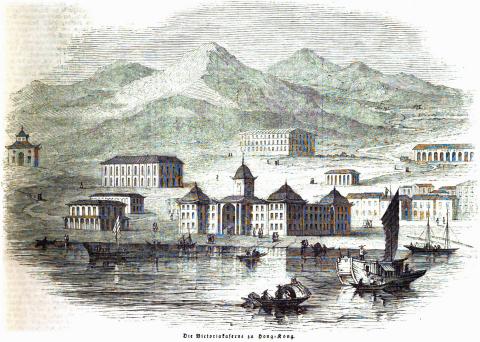An article in the German newspaper "Illustrirte Zeitung" (Illustrated magazine), published in Leipzig, from the 17 January 1846. This magazine was similar to the Gentlemen's Magazine from London. Fortunately, the German magazine has been digitised and is therefore available online.
The article itself is based on the original article from the Gentleman's Gazette, a paper published in Bombay. The article referred to in this post is in German - so translated from English to German, and back to English.
Since the French applied for possession of the island of Tshusan [Chushan Island, captured twice during the first opium war] in order to gain a similar base for their trade with China as the English have in Hong-Kong, the attention of the English has again been comparing these two Islands and the comparison turned out to be a great disadvantage of Hong-Kong.
The main content of the following report on the current state of the island is borrowed from the Gentleman's Gazette, a paper published in Bombay:
Hong-Kong, "the red harbour", is what the Chinese call one of the Ladrones or Thief Islands [Spanish name is “Islas de los Ladrones” (Islands of the Thieves)], which got its name from the notorious customs of its residents. It is 40 English Miles east of Macau and is 8 miles long by 2 - 4 miles wide. It is separated from mainland China by a canal a half to three miles in width and is cut by mountain ranges, the highest peaks of which are 1,000 feet above the sea. On the northern beach the new city of Victoria stretches for four miles. The island's fertility during the rainy season is insignificant; in the other months of the year it disappears into nothing. As the ground for the new buildings in Victoria was being dug, a foul-smelling mist came from a gas that was causing disease across the island. The climate is changeable and, due to its sudden transitions, dangerous for the health of the residents. Located on the border of the tropics, the colony has to suffer from a burning heat as long as the sun rises, and during the rainy trade winds that terrible plague-like gas rises from the earth, which, if it does not cause fever and rapid death, unnerves body and soul. It is calculated that every soldier comes to the hospital four times a year. The artillery, the infantry, and the ship's crew suffer equally. The British commander, General d'Aguilar, says that if Hong-Kong is not to be surrendered, an entire regiment must be sacrificed every three years, and that in order to have 700 serviceable men it will be necessary to maintain 1,400 men.
When the island was handed over to Captain Elliot in 1841, the population consisted of about 7,800 smugglers, stone cutters and tramps; The most brilliant promises were made to enable Chinese merchants and artisans to settle in Hong-Kong, and so the population in March 1842 amounted to 12,360 souls; in July 1845 it was about 19,000, but it consisted of the worst rabble from the neighbouring coast of China and not a single respected Chinese has settled on Hong-Kong in the four years since the British occupation. The Europeans who live there sleep with pistols under their pillows, because they are not safe of their lives and property either by day or by night. According to Dr. Gützlaff's [anglicised as Charles Gutzlaff, was a German Lutheran missionary served as interpreter for British diplomatic missions during the First Opium War. ] view was only beneficial to Hong-Kong when all the ports of China were still closed. As a fort it is not Gibraltar or St. Helena, and so it’s only use is that it serves as an opium depot, as long as the Chinese do not allow it to be imported into another port for a moderate duty.
The religious and moral influence of the Hong-Kong property on the Chinese cannot be neglected in any of this. For even if it is visited by the lowest class of the Chinese people, there is already a missionary association formed solely by Chinese, whose messengers, accustomed to hunger and grief and the most moderate needs, joyfully the new doctrine, which preaches primarily to the poor to be spread far and wide with blessed success over the province of Canton.
The reason why Hong-Kong was retained at the time the government of China signed the treaty with Sir Henry Pottinger and showed willingness to make great sacrifices was ignorance of the unhealthy situation in Hong-Kong and the belief that Tschusan is a highly unhealthy island for the Europeans. At the moment, as we know the situation better and many things have changed, there is no longer any reasonable civic, military, political, social, religious, financial or commercial reason to give preference to Hong-Kong over Chusan.
